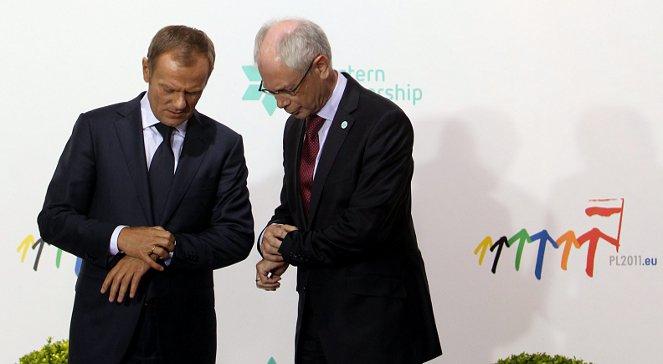
Prime Minister Donald Tusk and European Council President Herman Van Rompuy in Warsaw, 30.09.2011. Photo: PAP/Jacek Turczyk
The decision comes as other leaders from Eastern Partnership countries were invited to take part in the Summit, but not Alexander Lukashenko, the President of Belarus.
Due to a ban on Lukashenko entering the EU, the Summit’s organisers decided to invite Sergei Martynov, the country’s Foreign Minister. Ultimately, Minsk decided not to send its representative, and settled upon delegating its Ambassador in Warsaw, Viktor Gaisenak.
On Friday morning, it was clear that he too would not be attending, however.
Prime Minister Donald Tusk announced Belarus’ absence during the summit’s opening on Friday morning, stating that “this is another strong signal of just how important the changes which we are waiting for in Europe and Belarus are.”
Belarus decided to boycott the summit on the grounds of discrimination. A statement released by the Belarusian Embassy in Warsaw on Friday morning reads:
On the eve of the Eastern Partnership Summit, its organisers have taken an unprecedented move of discrimination against Belarus. They resigned from inviting the head of state of Belarus. They then limited the function of the head of the delegation that Belarus usually has in the Summit’s meetings. Such activity is a serious breach of the fundamental principles of the Eastern Partnership as agreed upon during the first Summit in Prague in 2009. Belarus undertook active preparations for the Summit and intended to take part in its meetings. However, under such conditions participation has been rendered impossible: partnership cannot rely on discrimination.
Nevertheless, the summit will carry on with business as usual, with talks on closer economic integration and the possibility of a visa-waiver programme for citizens of Eastern Partnership countries wishing to travel to the EU.
Poland’s EU Presidency spokesman Konrad Niklewicz said that “the decision of the Belarusian authorities will not have any influence on the summit’s proceedings or any declarations to come of it.”
“We regret that the Belarusian regime has taken the decision to isolate its 10-million strong nation from the benefits of cooperation in the Eastern Partnership summit, as well as the programme as a whole,” Niklewicz continues.
At a dinner on Thursday put on as part of the Eastern Partnership Summit, Prime Minister Donald Tusk offered a package for ‘a new, democratic Belarus’, but only on the condition that authorities in Minsk went into talks with the opposition, declared an amnesty for political prisoners, and undertook democratic parliamentary elections.
There was no condition that Lukashenko must step down, however. (jb)